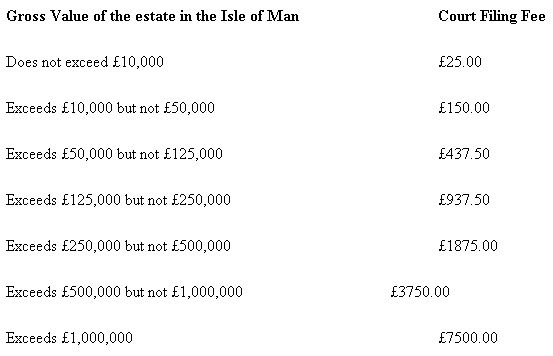- within Technology and Insolvency/Bankruptcy/Re-Structuring topic(s)
- in Australia
What is Probate and when is it necessary to obtain it in the Isle of Man?
Where an individual dies and at the date of his death he owned assets (whether land or personal property) located in the Isle of Man, it may be necessary for the personal representative(s) of the deceased to obtain a Grant of Representation from the Isle of Man Probate Registry to allow the personal representative(s) to administer the estate of the deceased in order that the estate can be distributed to the rightful beneficiaries.
There are three different types of Grant of Representation that can be issued:
Firstly, if the deceased made a will, then the personal representative(s) will be the person(s) named as executor(s) in the Will and they will need to apply for a document known as a Grant of Probate. The Grant of Probate confirms the validity of the Will and the appointment of one or more executors as personal representative(s).
Secondly, a Grant of Administration with Will annexed will be required where there is a valid Will but no executor appointed who is willing or able to carry out such office.
Thirdly, if the deceased did not leave a Will, the deceased is said to have died intestate. A Grant of Administration or Letters of Administration can be issued on an intestacy, in order to deal with the estate of the deceased. Where there is no will, the assets of the deceased, who can deal with the assets (known as the Administrator) and who is entitled to the assets is determined by legal rules.
Financial institutions and other corporations will normally require a copy of the Grant of Representation before releasing any of the deceased's assets to the personal representatives. This is to ensure they are releasing the assets to the correct person who is entitled to deal with such assets.
What if the deceased was domiciled outside of the Isle of Man?
If the deceased at the time of death was resident or domiciled in another jurisdiction but held assets in the Isle of Man, there is a similar procedure to that of obtaining a Grant of Representation. The Isle of Man Probate Registry will require along with the application, a court sealed or court certified copy of the grant of representation issued in the jurisdiction where the deceased was domiciled, together with a court sealed or court certified copy of the deceased's will (if there is one). If the documentation is written in a foreign language then the Isle of Man Probate Registry will require a notarised translation of the documentation into English.
Fees
Should an Isle of Man Advocate be instructed to assist in obtaining the Grant of Representation, there will be legal fees associated with the assistance provided by the Advocate. In addition, there are court filing fees which are payable when applying for a Grant of Representation. The court filing fee which is payable to the Isle of Man Government in relation to obtaining a grant of probate of a Will or Letters of Administration is based on the gross value of the deceased's estate. As of the July 1 2013 the filing fees are as follows:

The above fees include a cost of one certified copy of the grant of representation, however should additional copies of the grant be required, there will be an additional charge of £4.86 per copy. It is important to put on the application form the gross value of the estate, as if this is not included, the maximum fee will be charged.
How long will the application take?
Provided that there are no complications with the application, a Grant of Probate should be obtained within approximately four weeks from the date of application. All original documents supplied to the Isle of Man Probate Office will be permanently retained and once the grant has been issued, then all the information and documents provided will be a matter of public record and available for inspection at the Isle of Man Deeds Registry.
Simcocks is experienced in all aspects of Isle of Man succession law together with the administration of estates, including cases where there is a cross border element.
The content of this article is intended to provide a general guide to the subject matter. Specialist advice should be sought about your specific circumstances.


